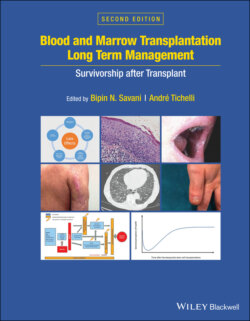Читать книгу Blood and Marrow Transplantation Long Term Management - Группа авторов - Страница 138
Thyroid dysfunction
ОглавлениеAbnormal thyroid function is most often associated with conditioning that includes irradiation which results in compensated or overt hypothyroidism [102]. Transient sick euthyroid syndrome (SES) is a well‐recognized, possibly adaptive response to severe systemic nonthyroidal illness and after HCT is more common in adults compared to children. SES is characterized by reduced free T3 or T4, reduced‐total thyroxine and a normal thyroid stimulating hormone (TSH). Compared to patients with a normal thyroid function panel, patients with SES were receiving higher glucocorticoid doses when thyroid function was tested but it is unclear to what extent high‐dose glucocorticoid therapy and acute GVHD were interdependent [103]. Thyroid hormone‐replacement is not indicated for SES. Isolated case reports and small case series have documented “auto”‐immune hyperthyroidism and hypothyroidism after allogeneic HCT and, in many of these cases, adoptive transfer of abnormal donor lymphocyte clones has been suggested as a possible mechanism but immune dysregulation associated with concomitant cGVHD might be a contributing factor [104,105]. Treatment of overt hypothyroidism or hyperthyroidism is identical to nontransplant situations. Though the clinical significance of antithyroid microsomal antibodies is unclear, it is of interest that these have been detected in 5%–40% of patients with cGVHD [106,107].
